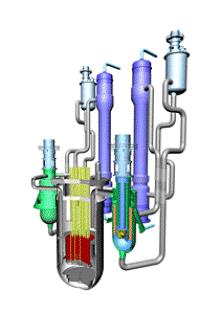Mitsubishi FBR Systems (MFBR), which will commence work on 1 July, is to be headquartered in Tokyo, Japan. Keizo Okada, general manager of MHI's Nuclear Systems Engineering Department, will be President of a staff of 60.
A company statement said that the separation of MFBR was part of a work program that has followed MHI's selection in April to be the core company to develop a new generation of FBRs as part of a Japanese national program. MFBR plans to have the conceptualdesign for a demonstration FBR prepared for 2015; ademonstration operating by 2025 and commercial units following from2050.
However, MHI is also part of a consortium that submitted proposals on 21 June for the US Department of Energy's Global Nuclear Energy Partnership (GNEP) scheme. GNEP would see advanced recycling fast reactors (ARRs) 'burn' uranium, plutonium and actinide wastes from used nuclear fuel recycling as part of a global closed nuclear fuel cycle.
Both the GNEP ARR and the Japanese future FBR would be liquid sodium cooled designs. MHI said: "MFBR will take charge of coordinating all activities geared to FBR development... The company is also targeted to play a major role in international collaboration in FBR development."
MHI as a whole is part of a consortium of Areva Inc. Battelle, BWXT, Japan Nuclear Fuels (JNFL) and Washington Group which are vying for the contracts to construct an ARR prototype, on which MHI would lead, and a prototype consolidated Fuel Treatment Centre on which Areva Inc. would lead.
Further information
US Department of Energy's Global Nuclear Energy Partnership
WNA's Fast Neutron Reactors information paper
WNN: Mitsubishi to develop Japan's next fast breeder reactor
Fast breeder reactors (FBRs) in Japan Unlike most of the reactors used today for nuclear power generation, FBRs make maximum use of uraniumresources by generating more fuel than they consume. They do this byusing fast neutrons to 'burn' uranium and plutonium mixed oxide(MOX) fuel, which can be surrounded by a uranium 'blanket' in whichslightly more plutonium is created than is used. The MOX fuel uses theplutonium recovered when used fuel, including that from conventionallight water reactors, is reprocessed. Unlike most of the reactors used today for nuclear power generation, FBRs make maximum use of uraniumresources by generating more fuel than they consume. They do this byusing fast neutrons to 'burn' uranium and plutonium mixed oxide(MOX) fuel, which can be surrounded by a uranium 'blanket' in whichslightly more plutonium is created than is used. The MOX fuel uses theplutonium recovered when used fuel, including that from conventionallight water reactors, is reprocessed.Recycling plutonium couldpotentially provide a long-term stable energy supply, and the Japanesegovernment sees the FBR as the main nuclear power generation system forthe 21st century, superseding light-water reactors. Japan already hasexperience with fast reactors, with the Joyo prototype reactor,operating since 1977, and the Monju prototype FBR which started up in1994. Monju has been offline since a sodium leakage in 1995 but it isslated for restart, possibly in 2008. |




_52351.jpg)


_15863.jpg)






